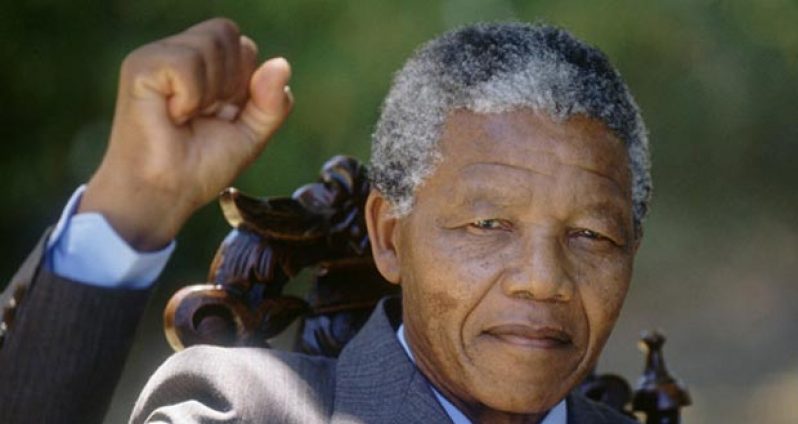Knowing him, as others may perhaps be better aware, ‘Sonny’ Ramphal could be amused by this journalist’s intervention to enquire: How could the governments of CARIC0M, among them that of Trinidad and Tobago – which currently holds the chairmanship — and even his native Guyana, have failed to recognise the appropriateness; the validity in extending an invitation for him to be present for that historic memorial service in Johannesburg?THERE was the strange notable absence of an internationally-renowned citizen of this region — Sir Shridath Ramphal — for the Caribbean Community’s quite encouraging “togetherness” at last Tuesday’s unique official “memorial service” in South Africa for the legendary Nelson Mandela.
Those acquainted with better-known literature involving the various significant contributions of Mandela and Ramphal would be aware of how the late fighter for freedom and human dignity had publicly voiced personal admiration for the internationally-recognised Caribbean intellectual and diplomat.
As three-term Secretary-General of the Commonwealth, Ramphal had played significant enabling roles during South Africa’s gigantic struggle to end the heinous apartheid governance system in South Africa and, more specifically, for the freeing of Mandela, the 95-year-old titan among the greatest of the world’s great who died on December 5, from 27 years of imprisonment.
In his 2008-released ‘Shridath Ramphal: The Commonwealth and the World’ essays by leading contributors in honour of the long-serving Guyana-born advocate for wider and deeper Caribbean integration and unity, Richard Bourne quotes Mandela in his introduction as commending Ramphal, as “one of those men who have become famous because, in their fight for human justice, they have chosen the entire world as their theatre…”
Earlier, Mandela had recommended as “a timely work deserving our full attention” the 1997-published 410-page report, ‘Our Global Neighbourhood’ from The Commission on Global Governance, of which Ramphal was Co-Chairman, with Sweden’s Ingvar Carlson.
Eminent Persons Group
A dozen years earlier, in 1985, at the Commonwealth Summit in The Bahamas, Ramphal was to be fully engaged in helping to establish what came to be known as the “Eminent Persons Group” (EPG) on South Africa’s struggle to end apartheid rule, and the establishment of the first democratically-elected government, with Mandela as President.
Among the seven chosen members of the EPG was a lone woman, the distinguished first female Governor-General of Barbados, and internationally recognised otherwise, the now late Dame Nita Barrow.
The EPG representatives held two meetings with Mandela, while he was in prison, and their report was to prove an effective political weapon in the decline of apartheid, and the freeing of Mandela to become the first democratically-elected President of South Africa.
However, it so happened that for last Tuesday’s memorial service, when the Caribbean region did well in showcasing an impressive regional presence — thanks to an initiative by the Prime Minister of Trinidad and Tobago, Kamla Persad-Bissessar (current chairperson of CARICOM), Ramphal was not among any of the delegations.
Was it a terrible oversight? Or was it just plain political ignorance about the sterling contributions to regional and international affairs by this widely recognized, articulate, most competent and committed son of the Caribbean?
In sharp contrast that perhaps reveals a better concept of people-oriented governance, or enlightened appreciation for its citizens who have made international contributions for a better world, the government of New Zealand chose to have among its delegation for the Mandela memorial service its well-known citizen and former Commonwealth Secretary-General, Sir Don McKinnon.
Deserving praise
The Trinidad and Tobago Prime Minister deserves the praise being showered on her at home for not only including in her delegation the country’s Opposition Leader (Dr Keith Rowley) as well as the chairman of the local Emancipation Support Committee (Khafra Kambon), but also for facilitating representatives of member governments of the Community to travel to South Africa from Piarco International for the ‘Mandela Memorial Service” on board state-owned Caribbean Airline Limited (CAL).
That particular aircraft has since been named after Nelson Mandela, as requested by the Prime Minister. However, as Chairman of CARICOM, she should perhaps explain whether it was just a surprising oversight that Shridath Ramphal, whose years in public life have been so deeply involved in Caribbean affairs, was not invited to be part of the “CARICOM presence” in South Africa.
For his part, on the day of the announcement of Mandela’s passing (December 5) Ramphal, in his tribute to the towering international icon, had reflected:
“Tomorrow’s children will not be able to say, as we can with pride and a deep sense of privilege, that we lived in the time of Nelson Mandela, a unique and memorable human being. ‘Madiba’ has gone from us; but he is part of eternity, and will always belong to the entire world…
“His indomitable spirit will forever inspire people in pursuit of freedom and justice; his humility will be a beacon for all who are wronged. He made our troubled age less shameful by his own nobility.
“He enriched my own life by the small part I played, as Commonwealth Secretary-General, in restoring him to freedom—even though he showed that truly ‘stone walls not a prison make, nor iron bars a cage’…”
Analysis by Rickey Singh



.jpg)








